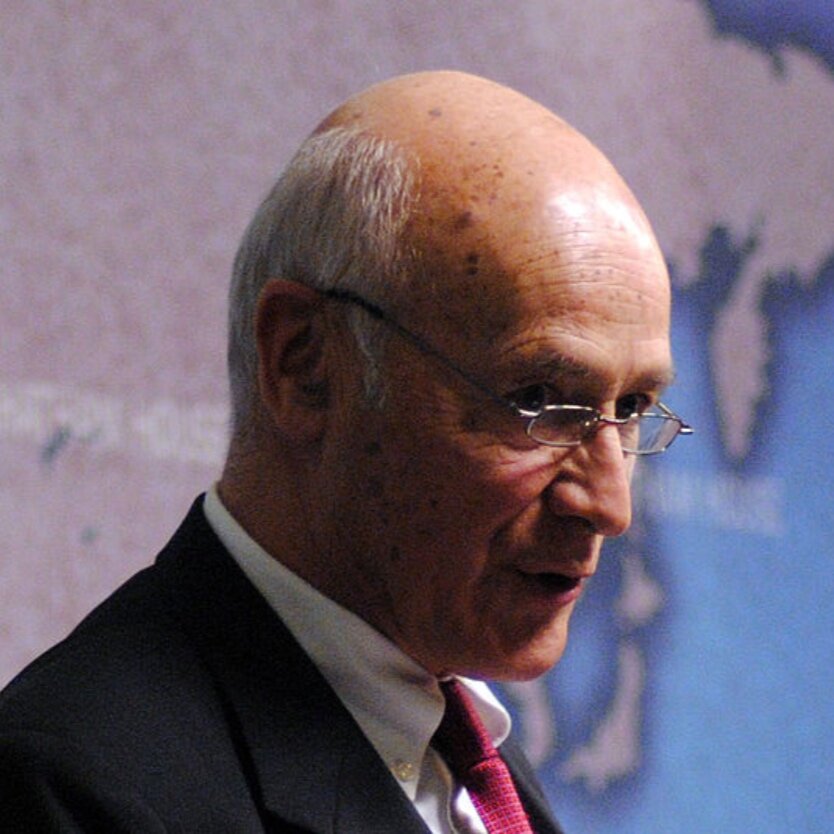Dr. Joseph S. Nye, Jr., is University Distinguished Service Professor and former Dean of the Kennedy School of Government at Harvard University. In 2009, a poll of international relations scholars listed him as one the most influential in the past twenty years and the most influential on American foreign policy. He received his bachelor's degree summa cum laude from Princeton University, studied at Oxford University on a Rhodes Scholarship, and earned a Ph.D. in political science from Harvard where he joined the faculty in 1964. From 1977-79, Nye was a Deputy Under Secretary of State and chaired the National Security Council Group on Nonproliferation of Nuclear Weapons. From 1993-94, he chaired the National Intelligence Council, and from 1994-95, he served as Assistant Secretary of Defense for International Security Affairs. He won Distinguished Service medals from all three agencies. Nye has published fourteen books, and more than 150 articles in professional and policy journals. Recent books include Is the American Century Over?, The Future of Power, The Powers to Lead, and Soft Power: The Means to Success in World Politics. He is the recipient of Princeton University’s Woodrow Wilson Award, the Charles Merriam Award from the American Political Science Association, France’s Palmes Academiques, and numerous honorary degrees.
Professor William Johnson is the Georgia S. Banker Professor of Economics at the University of Virginia, where he previously served as chair of the economics department for eight years. Before UVA, Professor Johnson received his Ph.D from MIT, served as a visiting professor at Stanford University and the University of Chicago, and contributed his work to the Office of Economic Opportunity in Washington, D.C. as well as the National Bureau of Economic Research in Palo Alto, California. Professor Johnson's research focuses on labor economics, public finance, the economics of education, and the economics of information. He has written countless articles on economics and policy for publications such as the Journal of Political Economy, the Review of Economics and Statistics, the Journal of Labor Economics, and the American Economic Review.
Americans widely recognize that a polarized media landscape is eroding our democracy, but few understand how the problem has developed over the last couple of decades.
Read MoreWhile the concept of spatial justice might be universally applicable, it has a locality in different parts of the world. In the United States, spatial justice is about equal rights. In China, spatial justice focuses on equal resources.
Read MoreThe anniversary of the Stoneman Douglas school shooting has come and gone, and people are still grappling with gun violence in the United States. Why has the government yet to pass comprehensive gun reform, and how does the lack of gun control impact the country?
Read MoreThe nutritional standards in our schools are a symptom of a larger problem—our government continues to rely on corporate interests instead of prioritizing the welfare of our citizens. For the government to truly act for the public welfare, they should start by addressing the vast misconceptions they perpetuate for America’s children.
Read MoreUnderstanding the size of a billion dollars constitutes a strong argument for the immorality of billionaires.
Read MoreEarmarking is a hot topic in Congress for both parties, but there have been talks of bringing the process back. Is it worth it, though?
Read MorePublic school funding systems are failing to provide equitable education for low-income populations. As the achievement gap between high and low-income areas widens, there is an emerging need for federal protections for all students.
Read MoreExperiencing disbelief from medical practitioners is frustrating. For most women, it is almost a guarantee.
Read MoreVirginia, once home to a bustling tobacco industry, has done what was previously unthinkable: raised the smoking age to 21. Why? E-cigarettes have begun to pervade schools across the nation, and states are scrambling to come up with solutions.
Read MoreIt is still too early to tell whether the sitting president can be defeated, but let’s first look at the past and consider what would help make a successful Democratic nominee in 2020.
Read MoreWhile the Green New Deal sets forth the type of ambitious goals necessary to tackle climate change, it also alienates key political actors and encourages politicization of climate action.
Read MoreOver half a million people spend their days without a roof over their head. Almost 200,000 sleep on the streets each night. This is a crisis of humanity and a failure of the market. Despite this, homelessness remains a non-issue on the national political stage and the government has not passed legislation that might provide the solution that our most vulnerable citizens desperately need.
Read MoreDevastating loss of insect biomass and diversity has made the rounds in headlines, but how effectively is the science communicated? Science communication of the insect collapse is well communicated due to the framing of scientific articles, but it doesn’t necessarily lead to political action.
Read MoreCelebrities may well have the most impactful political endorsements given their significant influence on their fans.
Read MoreThe 2018 midterms have created a unique situation for the Republican party and President Donald Trump. Although Democrats have created a divided government, Republicans and the President still have quite a few strategies they can use to accomplish their goals and prepare for the 2020 election using two vital tools: judicial nominations and the economy.
Read MoreToday’s problems with congressional dysfunction have been brewing for decades, but the biggest source may be the Republican wave of 1994.
Read MoreWhat happens when you can't keep watching the news because it's terrifying, but you can't look away because you have to stay informed? Tune in to some angry punk-rock.
Read MoreFor Democrats, November’s midterms gave them the ability to block the President’s agenda. In the process, they may have unintentionally destroyed any potential for bipartisan action on climate change.
Read More



















